★★★
“Marriage can be murder.”
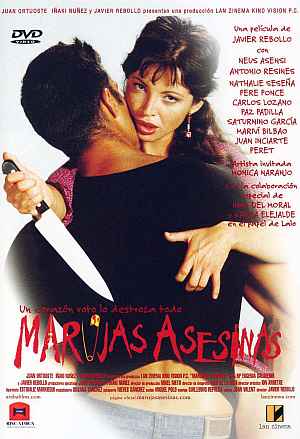 This tale of a Hispanic wife whose sanity disintegrates, beginning with the murder of her husband and ending with…well, you have to see it, had me shifting somewhat nervously, as my Hispanic wife sat beside me. “These are your people,” I said. Chris disavowed all knowledge, being Cuban rather than Spanish – while I can see her point, still… Azucena (Asensi) is unhappy in marriage to a greedy builder (Resibes), but his money keeps her family afloat, so she tolerates it, finding love with his hunky employee, Pablo. However, when the money looks like drying up, she hatches a lethal plan – which would probably go better if she didn’t hire the local retard [Non-PC that may be, there’s no other way to describe him; he agrees to do the murder for 1,000 pornos and a VCR]. However, that’s just the start: Pablo has a nasty surprise, and Azucena soon finds others needing disposal. And did I mention her TV is now talking to her?
This tale of a Hispanic wife whose sanity disintegrates, beginning with the murder of her husband and ending with…well, you have to see it, had me shifting somewhat nervously, as my Hispanic wife sat beside me. “These are your people,” I said. Chris disavowed all knowledge, being Cuban rather than Spanish – while I can see her point, still… Azucena (Asensi) is unhappy in marriage to a greedy builder (Resibes), but his money keeps her family afloat, so she tolerates it, finding love with his hunky employee, Pablo. However, when the money looks like drying up, she hatches a lethal plan – which would probably go better if she didn’t hire the local retard [Non-PC that may be, there’s no other way to describe him; he agrees to do the murder for 1,000 pornos and a VCR]. However, that’s just the start: Pablo has a nasty surprise, and Azucena soon finds others needing disposal. And did I mention her TV is now talking to her?
Things take a bit of time to get going, and for a while it looks like it’s going the tiresome, Almodovar route of “All men are bastards.” Fortunately, it starts to develop its own style, and Asensi is great in her role; you can see while the individual choices make sense, even if the end result is disastrous in every way. The director does a nice job mixing a number of genres: telenovelas [the Spanish soaps], black comedy and horror – particularly the final scene. Credit also to Karra Elejalde as the imbecile Lalo, who manages to bring humanity to a role which could easily no more than a stereotype. There is some unexplored potential in the idea of the heroine getting advice from her television, and that could easily have been expanded. Mind you, at 105 minutes, it is somewhat over-stretched too, and tightening of the early portions would have helped. Overall, though, the time passed quickly enough, even if I will be keeping Chris away from sharp objects for a while. :-)
Dir: Javier Rebollo
Star: Neus Asensi, Antonio Resines, Nathalie Seseña, Pere Ponce






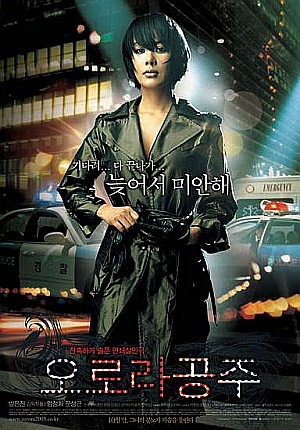 After inflicting Forbidden Warrior on Chris, my stock with her had slumped like Morgan Stanley. Fortunately, this Korean serial-killer flick provided a good measure of redemption. It stars in a department store, where Sun-Jung (Uhm) sees a mother abusing her young daughter, before leaving her and going into a stall. Sun-Jung shepherds the girl outside, breaks into the stall and stabs the mother repeatedly. The case is investigated by Detective Oh (Mun), who spots his ex-wife in the store security video. When bodies keep turning up, though killed in different ways, the police link the cases due to the cartoon stickers found on each scene. Oh gradually comes to suspect his wife is taking revenge on those holds she responsible – directly, or otherwise – for the death of their child, killed in a brutal kidnapping previously. Is that really the case, and if so, does he have the moral fortitude to turn in a woman he still loves as a murderer?
After inflicting Forbidden Warrior on Chris, my stock with her had slumped like Morgan Stanley. Fortunately, this Korean serial-killer flick provided a good measure of redemption. It stars in a department store, where Sun-Jung (Uhm) sees a mother abusing her young daughter, before leaving her and going into a stall. Sun-Jung shepherds the girl outside, breaks into the stall and stabs the mother repeatedly. The case is investigated by Detective Oh (Mun), who spots his ex-wife in the store security video. When bodies keep turning up, though killed in different ways, the police link the cases due to the cartoon stickers found on each scene. Oh gradually comes to suspect his wife is taking revenge on those holds she responsible – directly, or otherwise – for the death of their child, killed in a brutal kidnapping previously. Is that really the case, and if so, does he have the moral fortitude to turn in a woman he still loves as a murderer?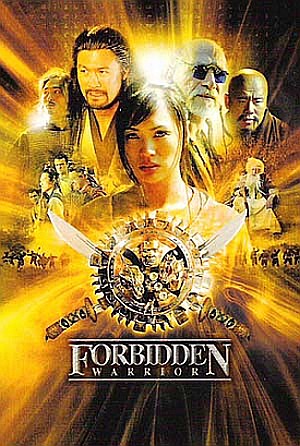 Though I couldn’t put my finger on why, large chunks of this seemed very familiar when I was watching it last night. Maybe it was just the story, cut from a template [mystical book, blah, chosen one, blah-blah, key to all power, etc.] we’ve seen a million times before. But then, when I Googled the film’s title, I realised why: at #6 was
Though I couldn’t put my finger on why, large chunks of this seemed very familiar when I was watching it last night. Maybe it was just the story, cut from a template [mystical book, blah, chosen one, blah-blah, key to all power, etc.] we’ve seen a million times before. But then, when I Googled the film’s title, I realised why: at #6 was 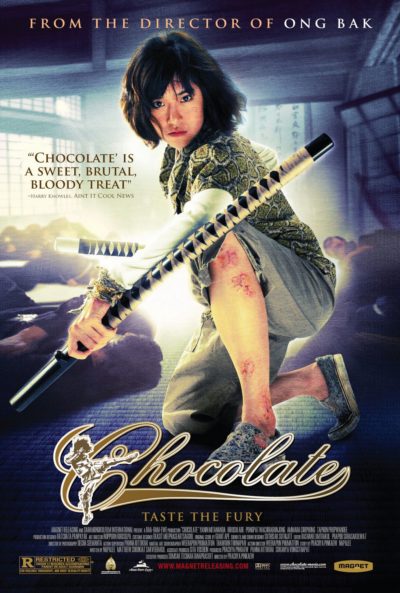 We couldn’t wait for this one to get an official American release, so off to Ebay we went for a copy of uncertain origin. This was something of a double-edged sword. It means we get to tell you that this is, hands down,
We couldn’t wait for this one to get an official American release, so off to Ebay we went for a copy of uncertain origin. This was something of a double-edged sword. It means we get to tell you that this is, hands down, 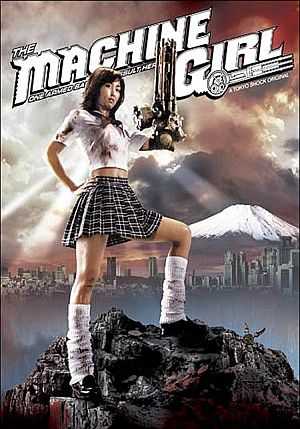
 If you enjoyed Planet Terror, you’ll likely get a kick out of this, which also combines elements of The Evil Dead, Kill Bill and Tetsuo the Iron Man into what has got to be the bloodiest movie of 2008. The life of Ami (Yashiro) is turned upside down when her brother and his friend are killed by school bullies under the control of a local gangster’s son (Nishihara). Ami sets out for revenge on all those responsible for the killings. But the Yakuza don’t take kindly to this and Ami finds herself with a count of functioning limbs that ends at three. Does that stop her? Of course not. Teaming up with the late friend’s mother Miki (Asami), whose husband happens to be an ace mechanic, Ami gets fitted with a machine-gun and the pair of vengeful vixens head off for a return match.
If you enjoyed Planet Terror, you’ll likely get a kick out of this, which also combines elements of The Evil Dead, Kill Bill and Tetsuo the Iron Man into what has got to be the bloodiest movie of 2008. The life of Ami (Yashiro) is turned upside down when her brother and his friend are killed by school bullies under the control of a local gangster’s son (Nishihara). Ami sets out for revenge on all those responsible for the killings. But the Yakuza don’t take kindly to this and Ami finds herself with a count of functioning limbs that ends at three. Does that stop her? Of course not. Teaming up with the late friend’s mother Miki (Asami), whose husband happens to be an ace mechanic, Ami gets fitted with a machine-gun and the pair of vengeful vixens head off for a return match.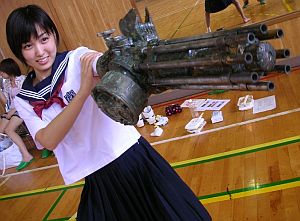 Yashiro’s background is in…well, what could politely be described as ‘bikini videos’, not action movies, but her performance here is respectable enough. Probably more impressive are Asami, and Honoka, who plays the wife of the Yakuza boss. They both, too, come from the adult industry, possessing an impressive feral intensity which reminded me of Brigitte Lahaie in Fascination, and is entirely in keeping with the grindhouse feel of the entire enterprise. You could argue that the trailer contains everything you need to see, in a more concentrated form, and I wouldn’t argue with that, or if you said this was no more than a porn variant, where nothing matters except the money shots of body fluids getting sprayed everywhere. Still, we had a blast, and the film fully lives up to the sleeve description, delivering the “One-Armed Ballistic Assault Heroine” it promises, in spades.
Yashiro’s background is in…well, what could politely be described as ‘bikini videos’, not action movies, but her performance here is respectable enough. Probably more impressive are Asami, and Honoka, who plays the wife of the Yakuza boss. They both, too, come from the adult industry, possessing an impressive feral intensity which reminded me of Brigitte Lahaie in Fascination, and is entirely in keeping with the grindhouse feel of the entire enterprise. You could argue that the trailer contains everything you need to see, in a more concentrated form, and I wouldn’t argue with that, or if you said this was no more than a porn variant, where nothing matters except the money shots of body fluids getting sprayed everywhere. Still, we had a blast, and the film fully lives up to the sleeve description, delivering the “One-Armed Ballistic Assault Heroine” it promises, in spades.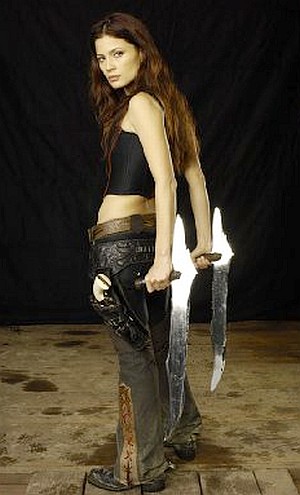 Look, I speak as one of the few people on the planet who found the original Bloodrayne other than unwatchable dreck. So when I say that the sequel is a soporific, poorly-constructed, badly-executed waste of time and effort for all concerned, including the viewer – for God’s sake, listen to me. There is simply no rhyme or reason present here, right from the setting which goes from Middle Ages Europe to the Wild West without any credible explanation. Billy the Kids (Ward) is a vampire, kidnapping the local kids, in some kind of half-baked plot device that makes no sense, involving him waiting for the railroad to reach town, to spread his curse. I guess going to a town that already
Look, I speak as one of the few people on the planet who found the original Bloodrayne other than unwatchable dreck. So when I say that the sequel is a soporific, poorly-constructed, badly-executed waste of time and effort for all concerned, including the viewer – for God’s sake, listen to me. There is simply no rhyme or reason present here, right from the setting which goes from Middle Ages Europe to the Wild West without any credible explanation. Billy the Kids (Ward) is a vampire, kidnapping the local kids, in some kind of half-baked plot device that makes no sense, involving him waiting for the railroad to reach town, to spread his curse. I guess going to a town that already 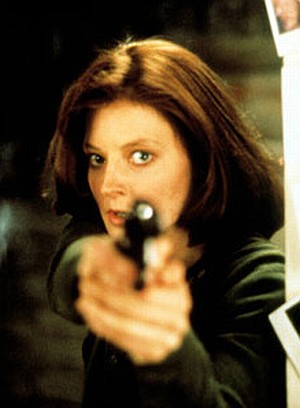
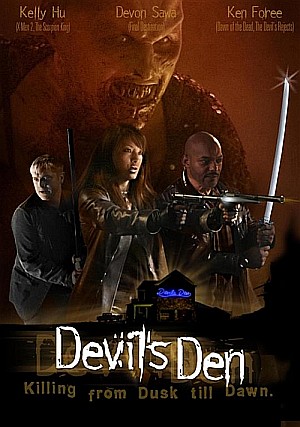 Sadly, despite the above tagline, the movie doesn’t quite live up to expectations. It has some very interesting ideas, but kinda goes about them the wrong way: I love the idea of a government task-force that roams the world, taking out vampires, werewolves, etc. I enjoy the concept of government-sponsored assassins, working on behalf of pissed-off senators. Instead, for the most part, the film wants desperately to be From Dusk Till Dawn – an admirable target, for sure, even if it falls short on almost every level. Vamp is another obvious touchstone for the script, which has Quinn (Sawa) stop off at the titular strip-club on his way back from Mexico, only to find the buffet is of the patrons, not
Sadly, despite the above tagline, the movie doesn’t quite live up to expectations. It has some very interesting ideas, but kinda goes about them the wrong way: I love the idea of a government task-force that roams the world, taking out vampires, werewolves, etc. I enjoy the concept of government-sponsored assassins, working on behalf of pissed-off senators. Instead, for the most part, the film wants desperately to be From Dusk Till Dawn – an admirable target, for sure, even if it falls short on almost every level. Vamp is another obvious touchstone for the script, which has Quinn (Sawa) stop off at the titular strip-club on his way back from Mexico, only to find the buffet is of the patrons, not 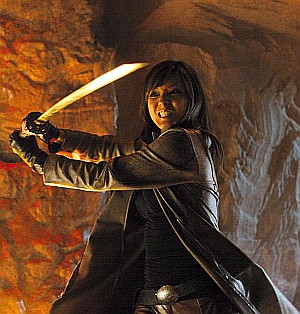 That said, there is a fair amount to enjoy here, with the performances, particularly of Foree and Sawa, being entertaining. Sawa is perfect as a stoner dude who, while initially freaked out for obvious reasons, eventually comes to terms with what’s going on: during the climatic fight between Caitlin and the queen ghoul, he just sits there with a goofy grin on his face, taking it in like we all would. Foree, a horror icon since his performance in Romero’s Dawn of the Dead, also delivers a quirky turn, and there’s a sublime sequence where he and Quinn, both fans of cinematic samurai Zatoichi, imagine what the blind swordsman would do in their shoes. Hu’s role builds gradually throughout the film, and eventually brings this into GWG territory, which I wasn’t expecting initially. She handles the action scenes fairl well, covering all the bases with gunplay, sword skills and martial arts – I note that one of the stuntwomen on the film is Zoe Bell, whom you should remember from her role in Death Proof. If the potential is never fully realized, there is enough going on to make it a pleasant-enough way to spend 85 minutes.
That said, there is a fair amount to enjoy here, with the performances, particularly of Foree and Sawa, being entertaining. Sawa is perfect as a stoner dude who, while initially freaked out for obvious reasons, eventually comes to terms with what’s going on: during the climatic fight between Caitlin and the queen ghoul, he just sits there with a goofy grin on his face, taking it in like we all would. Foree, a horror icon since his performance in Romero’s Dawn of the Dead, also delivers a quirky turn, and there’s a sublime sequence where he and Quinn, both fans of cinematic samurai Zatoichi, imagine what the blind swordsman would do in their shoes. Hu’s role builds gradually throughout the film, and eventually brings this into GWG territory, which I wasn’t expecting initially. She handles the action scenes fairl well, covering all the bases with gunplay, sword skills and martial arts – I note that one of the stuntwomen on the film is Zoe Bell, whom you should remember from her role in Death Proof. If the potential is never fully realized, there is enough going on to make it a pleasant-enough way to spend 85 minutes.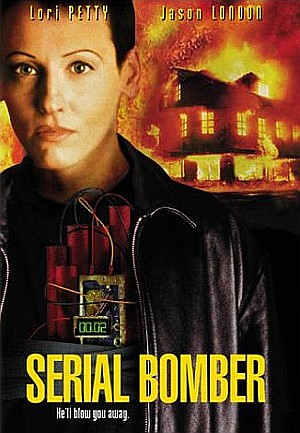 Mad bomber Chris Murdoch (London), is running around Seattle, blowing up Japanese people. FBI agent, Sara Davis (Petty) is part of the team looking into the case, but though they take Murdoch’s Japanese girlfriend (Kawagoe) into custody, Lt Sugimura (Amami) of the Tokyo police sweeps in and demands they release her, so she can be returned home – her father has influence on both sides of the Pacific. Davis won’t let that happen, since the girl is their main hope of catching the bomber; he, needless to say, is none too pleased to find the love of his life in the hands of the police.
Mad bomber Chris Murdoch (London), is running around Seattle, blowing up Japanese people. FBI agent, Sara Davis (Petty) is part of the team looking into the case, but though they take Murdoch’s Japanese girlfriend (Kawagoe) into custody, Lt Sugimura (Amami) of the Tokyo police sweeps in and demands they release her, so she can be returned home – her father has influence on both sides of the Pacific. Davis won’t let that happen, since the girl is their main hope of catching the bomber; he, needless to say, is none too pleased to find the love of his life in the hands of the police. The third in the series loses a lot of the loopy insanity that made the first one such a classic. Shiomi is still as kick-ass a heroine as ever, but I have to say, it was a severe struggle to remain conscious throughout, despite the brief 77-minute running time. By most accounts, the story is largely a re-tread of the second film, with Koryu Lee (Shiomi) going from Hong Kong to Yokohama, to track down a missing woman, only to find herself crossing paths, swords and a variety of other weapons, with local organized crime – since the target of her search is now the mistress of Oh Ryu Mei (Yamamoto). He pits wannabe warriors against each others in death matches, to decide who is fit to become a minion, only to find Lee is more than up to taking them on. He turns to freelancer Kurosaki (Kurata), who agrees to take out the unwanted snooper for twenty million yen.
The third in the series loses a lot of the loopy insanity that made the first one such a classic. Shiomi is still as kick-ass a heroine as ever, but I have to say, it was a severe struggle to remain conscious throughout, despite the brief 77-minute running time. By most accounts, the story is largely a re-tread of the second film, with Koryu Lee (Shiomi) going from Hong Kong to Yokohama, to track down a missing woman, only to find herself crossing paths, swords and a variety of other weapons, with local organized crime – since the target of her search is now the mistress of Oh Ryu Mei (Yamamoto). He pits wannabe warriors against each others in death matches, to decide who is fit to become a minion, only to find Lee is more than up to taking them on. He turns to freelancer Kurosaki (Kurata), who agrees to take out the unwanted snooper for twenty million yen.